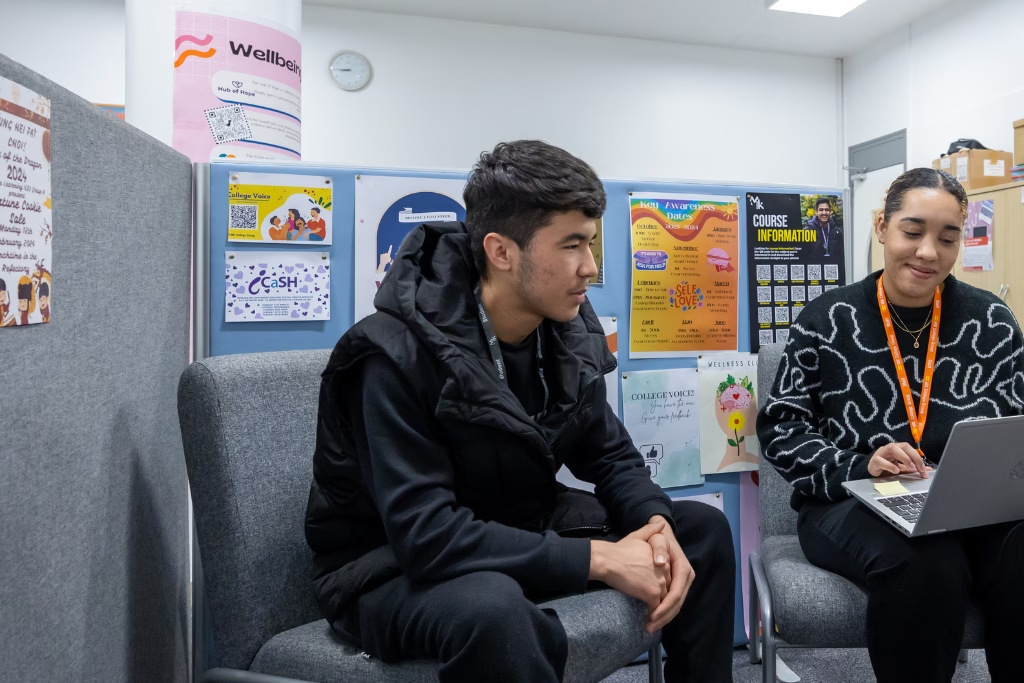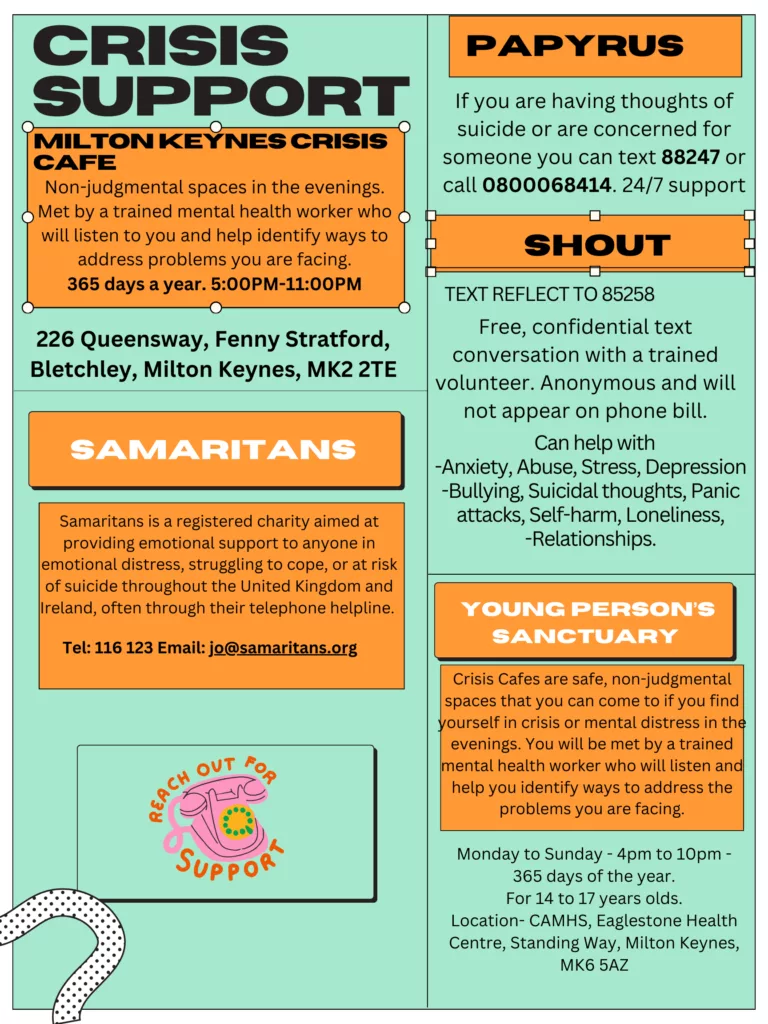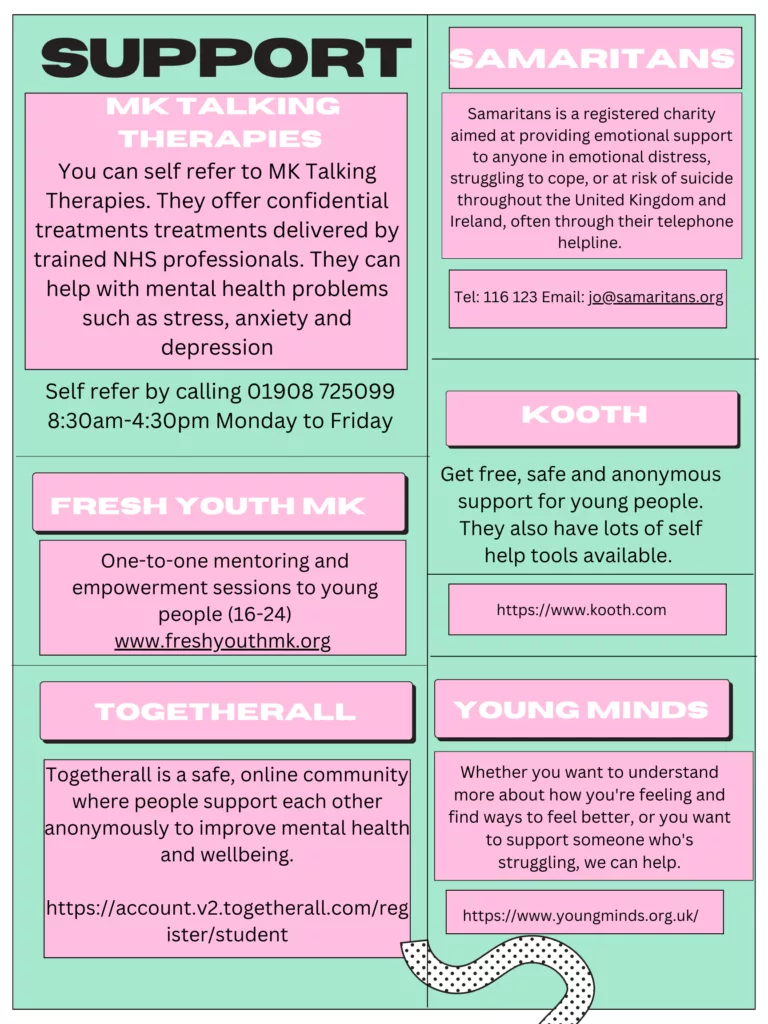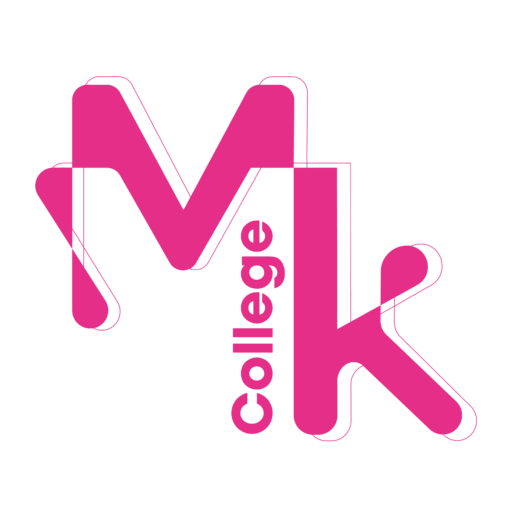Additional Learning Support
Additional Learning Support at Milton Keynes College
We understand that no two people are the same, and that means some people learn in different ways. We have an extensive support system when it comes to learning, and help is always available to those who need it.
Our learning support team is committed to providing a supportive and inclusive environment for all students. We work closely with academic staff, librarians, and other support services to ensure that students receive the help they need to succeed. Our team is experienced in working with students from diverse backgrounds and has a deep understanding of the needs of students with disabilities.
We believe that every student has the potential to thrive, and we are committed to helping them achieve their academic goals in a supportive, inclusive environment. If you have any questions about our learning support or would like to learn more about our services, please don’t hesitate to get in touch.
Contact Us
To find out more information about learning support, please e-mail ineedsupport@mkcollege.ac.uk or call us on 01908 684155.
We can also direct queries and commentary to the most appropriate member of the team through this avenue so that you get the most appropriate response

By choosing Milton Keynes College, students can expect:
- Personalised support tailored to individual needs, with close monitoring of progress.
- Friendly staff and a safe, confidential environment to discuss concerns.
- Coaching for life beyond college and access to resources, including laptop banks with accessibility features.
- Quiet, staffed spaces for study and peer support opportunities.
- Strong partnerships with local authorities and regular assessments of academic and wellbeing needs for SEND students.
- A firm approach to addressing behavioural issues and the serious handling of any targeting of students with protected characteristics.
Learning needs we support
Our specialist and friendly team could provide you with support and guidance in the following areas:
Social, Emotional, and Mental Health Needs
What are Social, Emotional, and Mental Health Needs?
Social, emotional, and mental health needs refer to the difficulties that students might encounter in their personal lives, such as:
- Managing stress, anxiety, or depression
- Coping with bullying or harassment
- Navigating relationships and friendships
- Dealing with trauma or past experiences
- Managing physical health conditions that impact mental health
These challenges can affect students’ ability to learn, engage in academic activities, and build positive relationships with peers and staff.
How can we support students with Social, Emotional, and Mental Health Needs?
Our college is committed to offering a range of support services to assist students with social, emotional, and mental health needs. These may include:
- One-to-one counselling sessions with trained therapists
- Therapy sessions addressing specific issues, such as anxiety or stress management
- Peer support for students who have faced similar challenges
- Training in mindfulness and relaxation techniques
- Referrals to external services or organisations for additional support
- Collaboration with academic staff to provide accommodations and adjustments
Why is it important to support students with Social, Emotional, and Mental Health Needs?
By recognising and addressing social, emotional, and mental health needs, we can help students:
- Improve their mental well-being and resilience
- Develop coping strategies and skills for managing challenges
- Enhance their academic performance and engagement
- Build positive relationships with peers and staff
- Foster a sense of belonging and connection to our college community
Additional Resources:
For more information on student mental health, please contact our well-being and safeguarding team at 01908 684444
We also recommend the following resources:


Autistic Spectrum Conditions
We recognise the importance of providing a welcoming and inclusive environment for all students, including those with Autism Spectrum Conditions (ASC). ASC is a neurodevelopmental condition that affects communication, social interaction, and behaviour.
What is Autism Spectrum Condition?
ASC is a spectrum condition, meaning it affects individuals in different ways and to varying degrees. Some people may experience mild symptoms, while others may have more severe difficulties. At Milton Keynes College, we understand the truth behind the commonly used statement, ‘if you’ve met one person with autism, you’ve met one person with autism’. However, common characteristics of ASC include:
- Difficulty with social communication and interaction
- Repetitive behaviours or interests
- Sensory seeking or sensory sensitive behaviours and sensory processing difficulties
- Challenges with understanding and processing social cues
- Echolalia (repetitive) verbal expressions
- Masking (hiding) signs of the condition
How can we support students with Autism Spectrum Conditions?
Our college is committed to providing a supportive and inclusive environment for all students, including those with ASC. We offer a range of accommodations and support services to help students with ASC thrive. These may include:
- One-to-one support from our autism-trained team
- Structured learning environments and schedules
- Use of assistive technology, such as text-to-speech software
- Social skills training
- Time outs as necessary and appropriate
- Access to our quiet room, which is both a safe space and sensory-friendly
- Accommodations for exams and assessments, such as extra time or a quieter, smaller room
Why is it important to understand and support students with Autism Spectrum Conditions?
At Milton Keynes College, we believe that every student deserves the opportunity to reach their full potential. By understanding and supporting students with ASC, we can help them overcome challenges and achieve their academic goals. We also recognise the importance of creating a welcoming and inclusive environment for all students, including those with ASC.
Note: We’ve used the term “Autism Spectrum Conditions” instead of “Autism Spectrum Disorder” (ASD) as it is more widely accepted and less stigmatizing, given that the prefix ‘dis’ can often carry negative connotations.
Specific Learning Difficulties (SPLD)
We recognise the importance of providing a supportive and inclusive environment for all students, including those with Specific Learning Difficulties (SpLD). We believe that every student deserves to feel supported and to reach their full potential.
What are Specific Learning Difficulties?
Specific Learning Difficulties (SpLD) refer to challenges that some students may face with learning, such as:
- Dyslexia: difficulties with reading, spelling, and writing
- Dyscalculia: difficulties with mathematics
- Dysgraphia: difficulties with writing and handwriting
- Dyspraxia: difficulties with coordination and motor skills
- Speech and Language Difficulties: difficulties with articulation, fluency, or comprehension
These difficulties can affect students’ ability to learn and access curriculum materials, and may impact their confidence and self-esteem.
How can we support students with SpLD?
Our college is committed to offering a range of support services to help students with SpLD. These may include:
- In-class support tailored to meet individual learning needs
- Adjustments to assignments and assessments, such as additional time or the use of assistive technology
- Provision of assistive technology, such as text-to-speech software integrated into all our ICT and reader pens
- Adaptations to teaching methods, such as visual aids and coloured overlays
- Collaboration with academic staff to provide accommodations and adjustments, such as documents printed to your preference
- Referrals to external services or organisations for additional support
Why is it important to support students with SpLD?
At Milton Keynes College, we believe that every student deserves to feel supported and to reach their full potential. By recognising and addressing SpLD needs, we can help students:
- Improve their learning outcomes and academic success
- Develop confidence and self-esteem
- Enhance their ability to access and participate in curriculum activities
- Build positive relationships with peers and staff
- Develop coping strategies and skills for managing challenges
Deafness and Hearing Loss
Supporting Deaf Students: Understanding and Accommodating Their Needs
At Milton Keynes College, we are dedicated to fostering a welcoming and inclusive environment for all students, including those who are deaf or hard of hearing. We believe that every student should feel supported and be able to achieve their full potential.
We have in-class BSL support assistants.
What are the Needs of Deaf Students?
Deaf students may have distinct needs and requirements to access and engage in college life. These needs might include:
- Communication support: such as British Sign Language (BSL), note-takers, or real-time captioning
- Access to audio materials: such as audio descriptions or transcripts of audio content
- Adaptations to teaching methods: such as visual aids, lip-reading, or gestures
- Access to technology: such as video conferencing software or text-to-speech software
- Accommodations for assessments: such as extra time or the use of assistive technology
How Can We Support Deaf Students?
Our college is committed to offering a range of support services to assist Deaf students in succeeding. These may include:
- Staff trained in BSL/Sign Language
- Access to BSL/Sign Language interpreters and note-takers
- Real-time captioning for lectures and meetings
- Audio materials in alternative formats
- Technology support and training
- Collaboration with academic staff to provide necessary accommodations and adjustments
Why is it Important to Support Deaf Students?
At Milton Keynes College, we believe every student deserves to feel supported and be able to reach their full potential. By recognising and addressing the needs of Deaf students, we can help them:
- Access and participate in curriculum activities with confidence
- Build positive relationships with peers and staff
- Develop independence and self-advocacy skills
- Enhance their academic performance and overall college experience
- Feel valued and included in our college community
English and Maths
Supporting Students with English and Maths Needs: Understanding and Accommodating Their Requirements
At Milton Keynes College, we recognise the importance of providing a supportive and inclusive environment for all students, including those who may require additional support with English or maths. We believe that every student deserves to feel supported and to reach their full potential.
What are the needs of students with English and Maths difficulties?
Some students may experience difficulties with English or maths due to a range of factors, including:
- Learning difficulties such as dyslexia, dyscalculia, or dysgraphia
- English as an Additional Language (EAL) or English Language Learning (ELL) needs
- Maths anxiety or phobias
- Limited prior experience or exposure to academic English or maths
- Cognitive or processing difficulties
These difficulties can affect students’ ability to access and participate in curriculum activities and may impact their confidence and self-esteem.
How can we support students with English and Maths needs?
Our college is committed to providing a range of support services to help students with English and maths needs. These may include:
- One-to-one support
- Small group sessions or revision workshops
- Online resources and tutorials
- Adaptations to teaching methods, such as visual aids
- Accommodations for assessments, such as extra time or the use of assistive technology
- Collaboration with academic staff to provide accommodations and adjustments
Why is it important to support students with English and Maths needs?
At Milton Keynes College, we believe that every student deserves to feel supported and to reach their full potential. By acknowledging and addressing the needs of students with English and maths difficulties, we can help them:
- Access and participate in curriculum activities with confidence
- Develop their skills and knowledge in English and maths
- Build positive relationships with peers and staff
- Enhance their academic performance and overall college experience
- Feel valued and included in our college community
Medical Conditions
Supporting Students with Medical Conditions: Understanding and Accommodating Their Needs
At Milton Keynes College, we recognise the importance of creating a supportive and inclusive environment for all students, including those with medical conditions that necessitate special accommodations. We believe every student deserves to feel supported and be able to reach their full potential.
What are the needs of students with medical conditions?
Some students may have medical conditions that require special accommodations, such as:
- Chronic illnesses, like diabetes, epilepsy, or asthma
- Allergies or food sensitivities
- Other medical conditions that require regular treatment or management
These conditions can affect students’ ability to participate in college activities and may necessitate adjustments to their daily routine or academic requirements.
How can we support students with medical conditions?
Our college is dedicated to providing a range of support services to assist students with medical conditions. These may include:
- One-to-one support
- Accommodations for assessments, such as extra time or the use of assistive technology
- Adaptations to teaching methods, such as flexible seating or alternative formats
- Suitable risk assessments to ensure your needs are met
- Access to external healthcare professionals on campus, such as a nurse or occupational therapist
- Collaboration with academic staff to provide necessary accommodations and adjustments
Why is it important to support students with medical conditions?
At Milton Keynes College, we believe that every student deserves to feel supported and to reach their full potential. By recognising and addressing the needs of students with medical conditions, we can help them:
- Access and participate in curriculum activities with confidence
- Develop their skills and knowledge in a safe and supportive environment
- Build positive relationships with peers and staff
- Enhance their academic performance and overall college experience
- Feel valued and included in our college community
Mental Health Difficulties
Supporting Student Mental Health: Understanding and Accommodating Their Needs
At Milton Keynes College, we recognise the importance of supporting students’ mental health and well-being. We believe that every student deserves to feel supported, included, and able to reach their full potential.
What are the needs of students with mental health concerns?
Some students may experience mental health issues, such as:
- Anxiety or stress related to academic pressures, social media, or personal issues
- Depression or low mood
- Thoughts of self-harm and suicidal ideation
- Trauma or post-traumatic stress disorder (PTSD)
- Eating disorders or disordered eating habits
- Substance misuse or addiction
- Other mental health conditions, such as bipolar disorder or schizophrenia
These concerns can affect students’ ability to access and engage in curriculum activities and may impact their overall well-being and quality of life.
How can we support students with mental health needs?
Our college is committed to providing a range of support services to help students with mental health concerns. These may include:
- Counselling and therapy services, either one-to-one or in groups
- Referral to external agencies or services, such as mental health charities or crisis helplines
- Access to online resources and self-help materials
- Support from our student welfare team, including pastoral support and crisis intervention
- Appropriate use of time-outs
- Adaptations to teaching methods, such as flexible learning arrangements or reduced workload
- Collaboration with academic staff to provide accommodations and adjustments
Why is it important to support student mental health?
At Milton Keynes College, we believe that every student deserves to feel supported and able to reach their full potential. By recognising and addressing the needs of students with mental health concerns, we can help them:
- Access and participate in curriculum activities with confidence
- Develop coping skills and resilience strategies
- Build positive relationships with peers and staff
- Enhance their academic performance and overall college experience
- Feel valued and included in our college community
Physical Disabilities/Mobility Needs
Supporting Students with Physical Disabilities: Understanding and Accommodating Their Needs
At Milton Keynes College, there is a strong commitment to fostering a welcoming and inclusive environment for all students, including those with physical disabilities. It is believed that every student deserves to feel supported, included, and capable of reaching their full potential.
What are the needs of students with physical disabilities?
Some students may have physical disabilities that require additional support, such as:
- Mobility impairments, including the use of wheelchairs or mobility scooters
- Sensory impairments, such as blindness or hearing loss
- Conditions affecting muscle strength or coordination, such as cerebral palsy or multiple sclerosis
- Chronic illnesses, such as diabetes or epilepsy
These physical disabilities can impact students’ ability to access and engage in curriculum activities and may affect their overall well-being and quality of life.
How can students with physical disabilities be supported?
Milton Keynes College is dedicated to offering a range of support services to assist students with physical disabilities. These may include:
- Accessible facilities and accommodations, such as wheelchair ramps, lift passes, and accessible toilets
- Adaptations to teaching methods, including the use of ICT or note-taking services
- Assistive technology, such as text-to-speech software or speech-to-text software
- One-to-one support
- Collaboration with academic staff to provide necessary accommodations and adjustments
- Referrals to external agencies or services, such as disability organisations or rehabilitation centres
Why is it important to support students with physical disabilities?
Milton Keynes College believes that every student deserves to feel supported and able to achieve their full potential. By recognising and addressing the needs of students with physical disabilities, the college can help them:
- Access and participate in curriculum activities with confidence
- Develop skills and knowledge in their chosen field
- Build positive relationships with peers and staff
- Enhance their overall college experience
- Feel valued and included in the college community
Study Skills
Understanding tasks and meeting deadlines can be supported through resources such as the Learning Resource Centre (LRC), Personal Development (PD) sessions, and booking study pods. Quality-first inclusive teaching practices are also essential in ensuring all students have the support they need.
Visual Impairments
Supporting Students with Visual Impairments: Understanding and Accommodating Their Needs
Milton Keynes College is dedicated to fostering a welcoming and inclusive environment for all students, including those with visual impairments. It is believed that every student deserves to feel supported and to have the opportunity to reach their full potential.
What are the needs of students with visual impairments?
Students with visual impairments may have specific needs and requirements to access and engage in college life. These needs might include:
- Access to alternative formats for learning materials, such as Braille or large print
- Use of assistive technology, such as screen readers or magnification software
- Accommodations for assessments, including the provision of Braille or large print materials, or additional time
- Access to mobility and orientation aids
- Support with daily living tasks, such as navigating the campus
How can students with visual impairments be supported?
The college is committed to offering a range of support services to assist students with visual impairments. These services may include:
- Access to assistive technology
- Alternative formats for learning materials, such as Braille or large print
- Accommodations for assessments, including the use of Braille or large print materials, or additional time
- Mobility and orientation aids
- Support with daily living tasks, including transition visits to help familiarise students with navigating the campus
- Collaboration with academic staff to provide necessary accommodations and adjustments
Why is it important to support students with visual impairments?
Milton Keynes College believes that every student deserves to feel supported and to have the opportunity to reach their full potential. By recognising and addressing the needs of students with visual impairments, the college can help them:
- Access and participate in curriculum activities with confidence
- Develop their skills and knowledge in a supportive environment
- Build positive relationships with peers and staff
- Enhance their academic performance and overall college experience
- Feel valued and included within the college community
Transition to Milton Keynes College
What to expect during your transition to Milton Keynes College
How Milton Keynes College will support you
We understand that starting college can feel a bit overwhelming, especially if you have additional learning needs. At Milton Keynes College, we’re here to help you every step of the way.
If You Have an EHCP
If you have an Education, Health and Care Plan (EHCP), your place at college goes through what’s called a consultation process. This means either you or your local council can ask us if we’re the right college for you.
We’ll review your EHCP, speak with your school and the council, and decide if we can meet your needs. Please make sure you tick the EHCP box when you apply so we know to look out for your plan.
We can only say no to a placement if:
- The course or setting isn’t suitable for your needs, age or ability, or
- Offering you a place would impact the learning of others or how we use resources.
It’s really important that your EHCP is up to date and reflects your current needs.
If we believe we can support you, we’ll invite you in before you start for an initial assessment. This isn’t a test – it’s just a chat to help us understand how you learn and what support works best for you.
If you or your parents want to apply for an EHCP while you’re studying with us, speak to our SENCo, who can guide you through the process.
If You Have SEND Support (But No EHCP)
If you don’t have an EHCP but still need extra help, tick the SEND support box when you apply. Our team will get in touch to find out more and make sure we can support you properly.
You’ll also be invited in for an initial assessment to help us build a support plan tailored to your needs.
Ongoing Support and Exams
We’ll review your support needs throughout your time at college. If you need adjustments for exams, we’ll look at this before you take them. Just be aware that some courses, especially work-based ones, might not allow extra arrangements due to industry standards.
Helpful Leaflets and Links
This section is packed with helpful leaflets and useful information to guide and support both students and parents or carers.


















